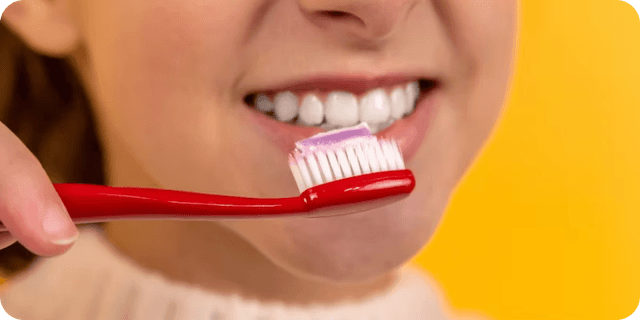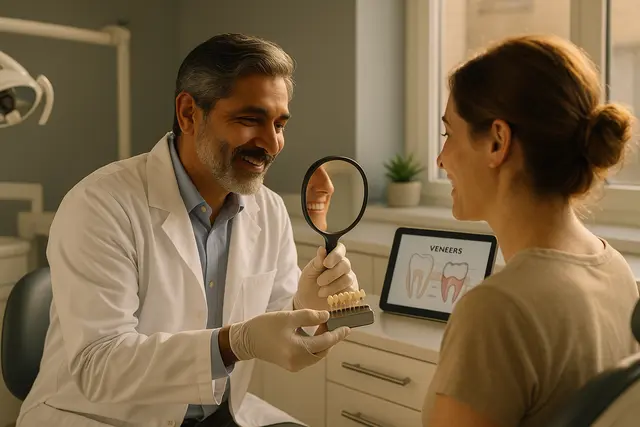Cosmetic Dentistry
5 min read
Mar 21, 2025
Can You Get Cavities Under Veneers? Prevention Checklist
Dental veneers improve the appearance of teeth, but they do not make them immune to decay. The natural tooth structure under veneers remains exposed to bacteria and acid erosion. Poor oral hygiene, diet, and infrequent dental checkups increase the risk of cavities forming beneath veneers. Protecting your teeth requires proper care and consistent habits.

You got veneers. Your smile looks fantastic. You’re flashing those pearly whites in every photo like you’ve just stepped off a toothpaste commercial. But now comes the million-dollar question: can you still get cavities under veneers?
Short answer? Yes. Long answer? Keep reading.
Veneers Aren’t Invincible Shields
Veneers aren’t magical armor. Whether you have porcelain veneers or composite veneers, they only cover the front surfaces of your teeth. Think of them as fancy jackets for your smile, not full-body armor. The natural teeth under veneers are still very much alive, with all the same needs (and vulnerabilities) they had before their glow-up.
Porcelain veneers may be stain-resistant and super durable, but they don’t protect the rest of the tooth from decay. The veneer itself cannot decay, but the tooth it’s bonded to? That’s a different story.
How Cavities Form (Even Under Veneers)
Cavities form when bacteria feed on food particles in your mouth, creating acid that slowly eats away at your enamel. Over time, this leads to holes in the tooth surface, aka cavities. Veneers and cavities aren’t mutually exclusive. If plaque and tartar sneak in around the edges where the veneer meets the tooth, decay can start to spread, especially if your enamel is already vulnerable to decay.
Here’s the kicker: the enamel is removed before your veneers go on, which leaves that area more susceptible to decay if proper oral care isn’t followed.
Your Dentist Isn’t Just for Emergencies
You might think your teeth look perfect, so why bother with a checkup? Big mistake. Your dentist will need to monitor your veneers and natural teeth underneath them regularly. A quick visit every six months can help catch cavities early, before they turn into a real mess. Good oral hygiene and regular dental visits are your secret weapons in this fight.
And trust us, the sooner your dentist spots anything off, the better the treatment options.
Yes, You Can Still Get Cavities
Some patients are surprised, shocked, even, to learn they can still get cavities with veneers. But the truth is, veneers only cover the front of a tooth. The rest of the tooth is still fair game for plaque, acid, and bacteria. So while veneers can provide a stunning smile, they don't stop cavities from forming if oral hygiene slips.
What About Cavities Under Veneers?
Cavities under veneers are tricky because you can’t always see or feel them until it's serious. They often hide under the veneer or around the gum line, leading to tooth sensitivity, tooth decay, and, in severe cases, damage that requires a crown, root canal, or even an implant.
This is where regular dental care comes in. With X-rays and careful exams, your dentist can detect decay under the veneer before it becomes a full-blown problem.
Your Prevention Checklist
Now that we’ve thoroughly scared you (kidding, mostly), here’s how to protect your teeth with veneers and avoid cavities:
Brush your teeth twice a day using fluoride toothpaste
Don’t skip the floss, even one skipped day gives plaque a head start
Use an antibacterial mouthwash for bonus points
Maintain good oral hygiene with consistent habits
Visit your dentist every six months for a checkup and professional cleaning
Avoid sticky sweets and sodas that like to party in your enamel
Ask your dentist about sealants or other ways to protect the teeth underneath
Keep your gums healthy, because gum disease invites bacteria in like an open door
An oral hygiene routine doesn’t have to be a chore. Think of it as self-care with long-term benefits. Your teeth, and your veneers, will thank you.
Porcelain vs. Composite Veneers: What You Should Know
Porcelain veneers are more resistant to staining and longer-lasting than their composite cousins. They’re a go-to for cosmetic dentistry because of their natural appearance. But composite veneers can be a more affordable option for some. Either way, the same rules apply: brush, floss, and don’t ghost your dentist.
Whether you chose porcelain or composite material, you’ve still got to protect your teeth and gums with daily brushing and flossing.
Maintaining Your Veneers
Veneers are a great investment, and like any investment, they need maintenance. The dentist bonds the veneers to your natural teeth, but if bacteria get in at the edges, you could be looking at costly repairs, or worse, removal.
So if you’re going to eat sticky candy or drink red wine every night, just know you’re playing a risky game with your get veneers smile.
Can You Get Cavities Under Veneers?
Let’s hit this one more time for the people in the back: yes, you can get cavities under veneers. Even the best dental work can’t stop tooth decay if oral hygiene goes out the window.
The teeth with veneers are still real teeth. The enamel is just dressed up, not replaced. So if you’re not brushing, flossing, or seeing your dentist regularly, you’re setting the stage for cavities and tooth decay, even with the most beautiful smile on Instagram.
Avoid Cavities, Protect Your Teeth
It all boils down to this: protect the teeth under the veneers like you would any other tooth. Veneers and natural teeth must work together as a team. Don’t let bad habits, lazy brushing, or skipped appointments wreck that harmony.
Avoid cavities with good oral hygiene and regular dental care. See your dentist often. Brush your teeth daily. Floss like a boss. And maybe, just maybe, don’t eat caramel popcorn every night.
One Last Thought
Getting veneers doesn’t mean you’re off the hook. It just means your smile got an upgrade, and upgrades deserve a little extra care. So if you want to keep your teeth healthy, your veneers looking fabulous, and your dentist proud, treat your oral care routine like the MVP it is.
Because sure, veneers can hide stains and straighten a few misaligned teeth, but they can’t fix a cavity hiding behind the scenes. Only you, and your toothbrush, can do that.
Can You Get Cavities Under Veneers?
Yes, you absolutely can. Veneers only cover the front of your teeth, leaving the rest of the tooth, especially the back and edges, exposed to bacteria and decay. If plaque builds up or oral hygiene slips, cavities can form underneath or around the veneers.
How Do Cavities Form Even With Veneers?
Cavities form when bacteria feed on sugars and produce acids that erode tooth enamel. Veneers don’t prevent this process. If plaque sneaks in at the edges or beneath the veneer, especially after enamel has been reduced for placement, tooth decay can still occur.
How Can You Prevent Cavities With Veneers?
Good oral hygiene is your best defense. Brush twice a day with fluoride toothpaste, floss daily, rinse with antibacterial mouthwash, and visit your dentist regularly. Avoid sugary or sticky foods, and consider sealants or other preventive care your dentist may recommend.
Do Porcelain or Composite Veneers Offer Better Protection?
Neither type prevents cavities by itself. Porcelain veneers are more durable and stain-resistant, but both types rely on how well you care for your natural teeth. Regardless of material, brushing, flossing, and routine dental visits are non-negotiable for cavity prevention.
Read Next
Related Posts

Cosmetic Dentistry
Looking for a Dentist Who Whitens Teeth? Here’s What to Know First
A brighter smile can do wonders for your confidence, but finding the right dentist who whitens teeth takes more than just a quick Google search. From treatment options to experience and safety measures, there are a few key things you should know before booking that whitening appointment.
3 min read
Sep 10, 2025

Cosmetic Dentistry
What Type of Dentist Does Veneers? Here’s Who to Trust With Your Teeth
Dreaming of a flawless, photo-ready smile? Veneers can be a game-changer, but only if you choose the right expert to apply them. Understanding who’s qualified to handle this cosmetic procedure is key to getting results that look natural and last for years.
5 min read
Sep 08, 2025

Cosmetic Dentistry
Cosmetic Dentistry and Implants: How They Work Together
A confident smile can do wonders for your self-esteem, and modern dentistry offers more ways than ever to achieve it. Whether you're dealing with missing teeth or simply want a brighter, more balanced look, cosmetic dentistry and dental implants provide powerful solutions that work hand-in-hand to restore both function and aesthetics.
5 min read
Sep 05, 2025
Don’t have time to research every dentist around you?
See why 30k+ patients trusted us